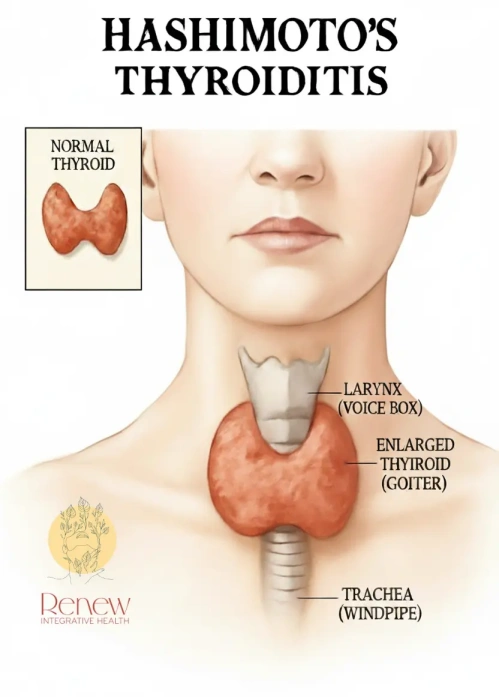What is Hashimoto’s Thyroiditis Disease?
Hashimoto’s thyroiditis is an autoimmune disorder where human body’s defense system gets confused and starts to attack thyroid gland. Normally, immune system is a powerful force that protects the body from foreign invaders like bacteria and viruses. But with Hashimoto’s, it mistakenly sees thyroid gland as a threat and launches a full-scale attack.
Thyroid is a small, butterfly-shaped gland located at the base of neck. Its main job is to produce hormones that control body’s metabolism—the process that turns food into energy for every cell, from brain to the heart.
As the immune system relentlessly attacks, it slowly destroys the thyroid’s hormone-producing cells. This causes the thyroid to become inflamed and firm, and over time, its ability to produce enough thyroid hormone declines. This results in an underactive thyroid, also known as hypothyroidism. This condition can affect anyone, but it is most common among middle-aged women.
Diagnosing Hashimotos
Patients may not have any symptoms of Hashimoto’s disease for years. The early sign often includes an enlarged thyroid, knows as goiter. It may cause front of the neck to look a bit swollen. In some cases, patients may feel it in the throat, or experience difficulty in swallow. But for most people they don’t see any symptoms, and pain in goiters has been noted in less than 10% of the cases. To confirm the diagnosis, A healthcare provider usually performs a physical exam and ask about health history and order blood work to measure thyroid hormone levels and check for specific antibodies.
Hashimoto Disease Symptoms
Hashimoto autoimmune thyroid disease symptoms may go undiagnosed for years as it progresses slowly. Eventually, the decline in thyroid hormone production may result in any or all of the following symptoms:
- Increased Tiredness and Sleepiness
- Hair Loss
- Dry Skin
- Brain Fog and Depression
- Joint Pain
- Heavier or irregular periods
- Muscle weakness, aches, or stiffness

Lab Tests
Thyroid Function Test (TSH Levels)
The standard of care for thyroid testing is a Thyroid Stimulating Hormone (TSH) level. TSH is the most common blood test ordered to check for hashimotos. A high TSH level indicates that the thyroid gland isn’t producing enough thyroxine (T4) hormone and is often a sign of an underactive thyroid. The problem with this narrow view is, by the time a TSH becomes abnormal from Hashimoto’s, extensive damage has already been done to the gland.
Free Thyroxine (T4) test
A T4 test measures the level of T4 in a sample of blood. Too much or too little T4 often leads to a thyroid problem. A T4 test alone can’t provide enough information to diagnose hashimoto. So, it’s usually combined with a TSH blood test.
Antithyroid Antibody Test
Specific thyroid antibodies can easily be assessed via blood labs, along with a thyroid ultrasound to assess for physical abnormalities such as inflammation, nodules or tumors.
Ultrasound
An ultrasound is not the primary way to test for Hashimoto’s, but it is used to identify characteristic physical changes in the thyroid gland, such as diffuse enlargement, a coarsened texture, and increased vascularity, as well as to rule out other conditions like thyroid nodules. While blood tests for thyroid antibodies are the most common diagnostic tool for Hashimoto’s, an ultrasound can confirm findings and aid in diagnosis, especially when antibody levels are uncertain or symptoms are unclear.
What causes Hashimoto’s disease?
It’s a combination of genetic and environmental factors, think of it like a puzzle where your genes provide some of the pieces, but the world around you fills in the rest. Genetic factors may involve certain human leukocyte antigen (HLA) genes or genes that regulate the immune system, while environmental triggers can include infections, stress, radiation exposure, micronutrient deficiencies, or excess iodine. Other than that following can also contribute:
- Long-term emotional or physical stress can throw off your hormonal and immune systems, making your body more susceptible to an autoimmune response.
- Certain foods, like gluten and dairy, can cause inflammation and contribute to what’s often called “leaky gut.” This can trigger a widespread immune reaction that eventually targets your thyroid.
- A viral or bacterial infection, or even exposure to environmental toxins, can sometimes confuse the immune system and cause it to turn on itself.
- Celiac disease: Although it does not directly cause Hashimoto’s thyroiditis, but there is a well-documented and strong association between the two autoimmune conditions. If you have celiac disease, your risk for developing Hashimoto’s is higher, and vice versa.
Hashimoto Disease Treatments
When dealing with a long-term condition, finding the right treatment for hashimoto thyroid can feel like a journey with a few different options to explore. While conventional medicine and functional medicine may seem to be at odds, they can also be seen as two complementary approaches that offer unique benefits to patients. Conventional medicine provides a well-established and standardized approach to managing symptoms, while functional medicine takes a more holistic view, seeking to address the underlying root causes of the disease. By exploring both avenues, patients can better understand their options and work with their healthcare providers to create a comprehensive and personalized treatment plan.
Conventional Medicine Approach
This approach primarily focuses on managing the symptoms of hypothyroidism that result from Hashimoto’s disease. The goal is to restore normal thyroid hormone levels in the body. Hashimotos disease is most commonly treated with a daily pill of levothyroxine, a synthetic hormone same as the one produced by thyroid gland. This medication is usually taken for life.
Initially, Patients see doctor or nurse several times for blood tests to check thyroid-stimulating hormone (TSH) levels. Since this hormone works slowly, it can take months for symptoms to fully disappear. Once TSH levels are stable, they won’t need to be seen as often.
Functional Medicine Approach
Conventional medicine does not offer a specific treatment to lower thyroid antibodies which are destroying the gland. Identifying the contributing factors that cause Hashimoto’s is crucial to strengthening the immune system and preserving the thyroid gland and its functionality. Functional medicine approach operates on the belief that the body can be supported to heal itself by identifying and eliminating triggers. This video below on The Functional Medicine Approach To Hypothyroidism And Hashimoto’s Disease provides a functional medicine perspective on this condition.
As hormone levels decline, replacement of T4 and T3 thyroid hormones can be life changing. Various treatment options are available with a trained functional medicine provider. The use of Low Dose Naltrexone can be helpful to slow the progression of the disease by acting directly on the immune cells to stimulate or restore normal immune functions. Other than that some common treatments for hashimotos in functional medicine include:
FAQs – Common misconceptions and questions related to hashimotos
How serious is hashimoto’s disease?
How does hashimoto’s disease affect women?
- Difficulty Conceiving: The irregular menstrual cycles can interfere with ovulation, making it harder for a woman with Hashimoto’s to get pregnant.
- Pregnancy Complications: The unborn baby’s brain and nervous system need thyroid hormone to develop. Untreated Hashimoto’s disease can lead to preeclampsia, miscarriage, birth defects, premature birth and low birth weight, or other problems in both mom and the baby.
- Postpartum Thyroiditis: Some women develop thyroid problems after giving birth, which can be related to their underlying Hashimoto’s.
Does Hashimoto’s disease always lead to an underactive thyroid, or can it cause an overactive thyroid at first?
While Hashimoto’s disease is the most common cause of an underactive thyroid (hypothyroidism), it can occasionally cause a temporary period of an overactive thyroid (hyperthyroidism). This brief phase is known as hashitoxicosis.



